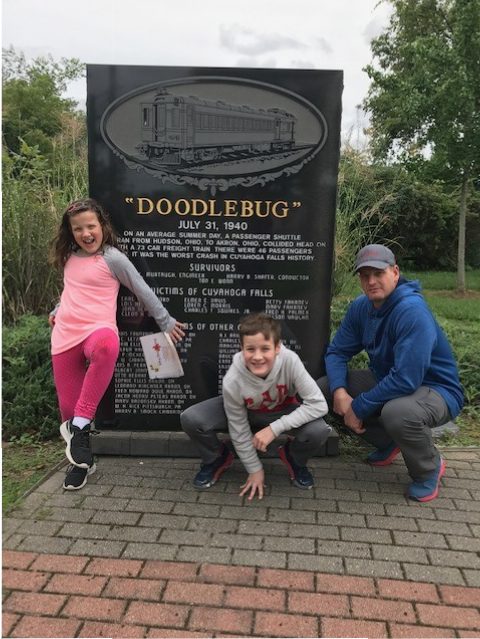The pioneers depended on their guns as well as the spade in order to eat. Agriculture was difficult in spite of the good soil. After clearing land and tilling there was still stumps and boulders and roots that made cultivation difficult.
Venison was the most prized of the larger game meats. “Deer Shining” was one of the favorite ways of hunting. The pioneer would paddle slowly along the river after dark, carrying a burning torch in his canoe. The deer, seeing the light, would stand still for safety’s sake. Their eyes glowed out of the darkness and the pioneer would raise his muzzle loading rifle and shoot between the eyes.
Hogs and sheep were precious animals. They were brought to this vicinity at great expense. The sheep furnished meat for the table and wool for clothing. The hogs furnished a welcome relief to the diet, and supplied the cupboard with lard and hides for shoe soles.
It was hard to keep sheep and hogs because the wolves were fond of sheep and the bear was the natural enemy of hogs. Whenever a pig squealed, the pioneer took his rifle from the antlers above the fireplace, and went out to kill the bear. Bear do not die easily. There is one story of a bear killed in these parts after a hand to hand combat with a hunter who used a knife, and when cleaning the bear they found eleven bullets each one from a different settler. Rifles varied greatly in bore, and everyone knew the bore of every rifle in the vicinity.
Although there are no records of any human being having fallen victim to the wolves in this vicinity, there were several instances where women going from one cabin to another on horseback were chased by the ravenous animals and were saved by the courage of their horses.
Wolves and snakes were the greatest fears of the women. The rocky parts of the neighborhood were full of rattlesnakes. The hogs helped in exterminating these. In several communities, groups were formed for killing snakes, and there is a tale of how the blacksmith of Stow, finding a den of rattlers in a pit at the Gorge one Sunday morning in early spring, plugged up the crevice which was their only way out with a limb torn from a tree, and lowered himself among them and killed several dozen of them single handedly with a club. This was a highly noble thing to do for the blacksmith due to the fact that blacksmiths were not allowed by town law to kill snakes because they were so valuable. But this did not stop this settler.
There is also a story of a sow belonging to one Western Reserve pioneer which was attacked by a bear. The bear had eaten the flesh of the pig from its neck to its tail. Instead of killing the hog the settler smeared the wound with pitch and it continued to survive, having many more litters.
The hog, brought here as a domestic animal, soon became part of wildlife when escaped swine ran wild in the woods. One pioneer saw a drove of them kill a wolf when the wolf tried to steal a young hog.
Johnnycakes
First, beat one egg, and stir in 2 cups cornmeal, 3/4 teaspoon salt, and 1 1/2 cups milk. This is your batter. Drop spoonfuls of this batter on a well-greased pan, and fry until they’re brown on both sides. Serve them hot, with butter or sugar. Yield: 10 – 12 cakes.
Appleade
Core and cut 2 large apples (don’t peel them), and put them in a pan. Meanwhile, bring to a boil 1 quart (1 liter) of water, and pour over the apples. Let the mixture sit for 30 minutes or so. Strain it, and sweeten the drink with sugar. Serve chilled.
The “poor” meal
Barley bread is made by grinding up barley into flour and putting that into a porridge to make dough. Cook in sun or stone oven until done. Add onions for special occasions.
Beer was made by grinding up barley into flour and putting it into a container (clay). Add water. Let it ferment in the sun until well fermented. Sift out all of the solids that are unnecessary to drink.

